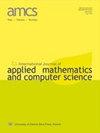非线性LPV模型的参数可辨识性
IF 1.2
4区 计算机科学
Q3 AUTOMATION & CONTROL SYSTEMS
International Journal of Applied Mathematics and Computer Science
Pub Date : 2022-06-01
DOI:10.34768/amcs-2022-0019
引用次数: 0
摘要
线性变参数模型作为连接线性模型和非线性模型的桥梁,越来越受到人们的重视。从数学的角度来看,大量的非线性模型可以改写成LPV或拟LPV形式,以简化其分析。从实用的角度来看,这种模型可以用来引入不同的模型参数,例如,一个部件的非恒定特性或设备的退化。这种方法经常被用于几种基于模型的系统维护方法中。因此,这些参数的可识别性是评估其值的关键问题,可以根据这些值做出决策。然而,这些模型的可识别性问题仍处于初级阶段。本文提出了一种验证LPV或拟LPV状态空间模型未知参数可辨识性的方法。它利用类似奇偶空间的公式来消除模型的状态。分析得到的输入-输出-参数方程,以验证原始模型或未知参数子集的可识别性。这种方法为连续时间和离散时间模型提供了一个框架,并通过各种例子进行了说明。本文章由计算机程序翻译,如有差异,请以英文原文为准。
Parameter Identifiability for Nonlinear LPV Models
Abstract Linear parameter varying (LPV) models are being increasingly used as a bridge between linear and nonlinear models. From a mathematical point of view, a large class of nonlinear models can be rewritten in LPV or quasi-LPV forms easing their analysis. From a practical point of view, that kind of model can be used for introducing varying model parameters representing, for example, nonconstant characteristics of a component or an equipment degradation. This approach is frequently employed in several model-based system maintenance methods. The identifiability of these parameters is then a key issue for estimating their values based on which a decision can be made. However, the problem of identifiability of these models is still at a nascent stage. In this paper, we propose an approach to verify the identifiability of unknown parameters for LPV or quasi-LPV state-space models. It makes use of a parity-space like formulation to eliminate the states of the model. The resulting input-output-parameter equation is analyzed to verify the identifiability of the original model or a subset of unknown parameters. This approach provides a framework for both continuous-time and discrete-time models and is illustrated through various examples.
求助全文
通过发布文献求助,成功后即可免费获取论文全文。
去求助
来源期刊
CiteScore
4.10
自引率
21.10%
发文量
0
审稿时长
4.2 months
期刊介绍:
The International Journal of Applied Mathematics and Computer Science is a quarterly published in Poland since 1991 by the University of Zielona Góra in partnership with De Gruyter Poland (Sciendo) and Lubuskie Scientific Society, under the auspices of the Committee on Automatic Control and Robotics of the Polish Academy of Sciences.
The journal strives to meet the demand for the presentation of interdisciplinary research in various fields related to control theory, applied mathematics, scientific computing and computer science. In particular, it publishes high quality original research results in the following areas:
-modern control theory and practice-
artificial intelligence methods and their applications-
applied mathematics and mathematical optimisation techniques-
mathematical methods in engineering, computer science, and biology.

 求助内容:
求助内容: 应助结果提醒方式:
应助结果提醒方式:


